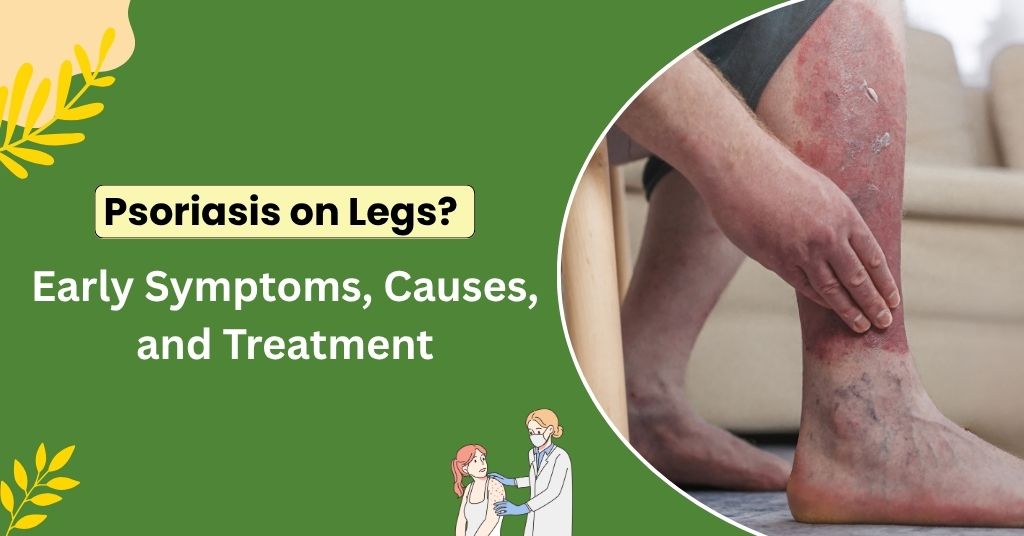Are you struggling with unusual discoloration along with itchy & flaky skin on your legs? And, did you know, these could be the early signs of psoriasis on legs. The psoriasis-affected area on the legs may also have raised silvery scales, or plaques, and appear different from the rest of the skin. According to a recent report, approximately ~3% of the Indian population is struggling with psoriasis. Psoriasis patches may appear on the knees, in skin folds such as the groin or the back of the knee, or on several other parts of the legs.
Well, before diving more into the details of the psoriasis on the legs in particular, let’s first understand what psoriasis is!
Know What Psoriasis Is!
Psoriasis is an autoimmune skin health disorder wherein the body’s immune system gets hyperactive and mistakenly targets its own healthy skin cells. It triggers the accelerated growth of skin cell formation, which further leads to the formation of thick, scaly patches, sometimes called plaques. Although signs and symptoms of psoriasis may develop anywhere on the body, they are often noticed on the knees, calves, shins, thighs, and even the toenails. Herein, you must be careful to notice that if you are experiencing itching in the legs, you must immediately consult a dermatologist for a proper diagnosis. Although it is a non-contagious condition, several treatments, along with early detection, may help treat the early signs of psoriasis correctly. These will help you manage the condition and keep symptoms and flare-ups under control.
Several types of psoriasis exist, and it is essential to understand how they affect the legs. Plaque psoriasis is the most common psoriasis type and is identified by the raised red patches on skin, often covered in silvery scales. During the case of psoriasis on the legs, these symptoms most commonly appear on the shins or calves. Other psoriasis types, such as guttate or inverse, may also affect the legs in different ways.
Role of the Immune System In The Development of Psoriasis
Our immune system’s major responsibility is to guard our bodies against several infections and external aggressions. During psoriasis, the immune system gets activated in an unbalanced manner, causing the acceleration of the skin cells’ turnover cycle. Ordinarily, some of these cells, the keratinocytes, die and are replaced with new cells, about every 28 days. But in people struggling with psoriasis, the renewal time gets almost ten times faster. It causes the keratinocytes to accumulate and form red raised patches or thickened plaques covered with scales.
What Does Psoriasis Look Like On Legs?
Although the psoriasis on legs symptoms are similar to the ones that appear on other parts of the body, the specific symptoms that the patients may experience depend on the type of psoriasis they are diagnosed with. Generally, they experience flaky patches on the skin, which can become inflamed, scaly, and may also cause burning sensations and itching. Since psoriasis symptoms often appear on the knees, many individuals with this condition may experience it on their legs at some point.
Early diagnosis and detection can help recognize psoriasis on the legs and manage the condition before it worsens further. Quite often, the patients experience circular or oval-shaped patches that may appear suddenly or grow gradually. These could be painful and swollen. The following are the various symptoms that will help you identify them.
- Red, inflamed patches appear often on the knees, shins, and front or back of the thighs, covered with silvery-white scales
- Extreme itching, leading to intense scratching, causing further irritation on the skin
- Dry and flaky skin that may crack and bleed, increasing the risk of infection
- Changes in the nails of the individuals, such as pitting or thickening
A homeopath may diagnose your skin condition based on the biopsy reports and appearance of the patches, along with the medical history of the patient. Early diagnosis and beginning with a proper psoriasis treatment regimen are essential to prevent further progression.
Causes
Several studies have documented that the immune system becomes hyperactive, leading to various changes in your skin. For example, plaque psoriasis causes the skin cells to multiply too quickly, resulting in a buildup of skin cells that appear as plaques, scales, and flakes on the skin. Several other factors affecting the condition of patients struggling with psoriasis include genetic and family history. Other risk factors could be excessive smoking, obesity, and consuming certain medications like beta-blockers, lithium, or antimalarials. Additionally, people prone to stress, infections such as strep throat, those who habitually consume tobacco, live in cold weather, and consume alcohol, etc., are also prone to developing psoriasis.
How Do You Treat Psoriasis On Legs?
The team of psoriasis specialists at Bharat Homeopathy will help you find the best treatment, or a combination of lifestyle changes, dietary regimens, and homeopathic medicine for psoriasis tailored exclusively to suit your individual needs and symptoms. The plan is designed after a comprehensive assessment and evaluation of the patient’s medical history and condition. For mild cases of psoriasis on the legs, our expert will advise you to begin with certain home remedies for psoriasis on the legs, psoriasis creams and ointments, along with homeopathic medicine for psoriasis.
Bharat Homeopathy: Treatment For Psoriasis On Legs
Bharat Homeopathy provides the best psoriasis treatment in Gurugram to patients struggling with the psoriasis skin disorder. With a team of more than 15 specialists, we specialize in treating every type of psoriasis and related skin conditions, offering advice through various counseling sessions, and sharing our patients’ stories with others who are struggling with psoriasis and psoriatic arthritis. We provide the best psoriasis treatment in Gurugram to patients struggling with the psoriasis skin disorder.
If you are also living with psoriasis on your legs and struggling to find an effective homeopathic treatment for psoriasis, contact our expert team of doctors online/offline and tell us the symptoms you are experiencing. Also, for the expert advice, share your experience in the comments section below.


